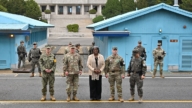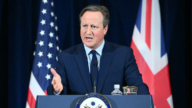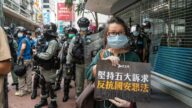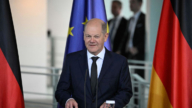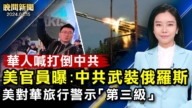【新唐人2014年04月29日訊】美國總統歐巴馬即將結束對亞洲四國的訪問。他在日本、韓國、馬來西亞和菲律賓,都強調了美國對亞太國家的安全保護。輿論形容歐巴馬的這次亞洲之行是「不到中國卻不忘中國」。這和美國所提到的安保有何聯繫呢?讓我們一起去聽聽專家們的分析。
28號下午,美國總統歐巴馬已經抵達菲律賓,這是他亞洲四國之行的最後一站。美國駐菲律賓大使戈德伯格,在歐巴馬到訪前幾個小時,與菲律賓國防部長蓋茲敏,簽署了為期10年的《增強防務合作協議》。
這項協議允許美軍臨時使用多個菲律賓軍營,由此得以調遣戰鬥機和軍艦。協議制定了美國軍隊及軍艦、戰鬥機等設備,輪換進駐菲律賓軍事基地的框架。美方強調,這項加強防衛合作的協議將促進地區的和平與安全。
在歐巴馬亞洲行的前三站,美國與日本、韓國和馬來西亞,也就戰略夥伴合作關係、以及國防安全合作、海上安全等廣泛交換了意見。美國《紐約時報》評論歐巴馬此行是「不到中國卻不忘中國」。
美國《中國事務》雜誌總編輯伍凡:「第一個就是要聯合他的盟國,來抑制中共的擴張。第二個信號:用武力,同盟也好,聯盟也好,增加兵力,來防止戰爭。特別在日本釣魚島,一定要用和平方式、外交方式談判,但是又要支持日本,讓它放心跟中國打交道。」
據了解,美國白宮已經命令國防部調整全球的軍力部署,把60%的美國海軍放到了太平洋地區。英國《星期日泰晤士報》評價美菲合作協議的主旨是:「在直白的警告中國,不要在該地區動武」。「英國廣播公司《BBC》」也報導說,「歐巴馬此行的主要目地似乎是向亞太盟國保證,美國將堅決支持他們對抗中國(中共)日益頻繁的霸凌行為」。
伍凡:「從宏觀上來看,美國要重返亞太,戰略再平衡。它遠離亞太,所以它這裡一定要有補給基地,要有盟友。尤其對菲律賓,建立了十年的防衛協定。都是為了要戰略上要防止發生戰爭,來抑制中共的擴張。」
美國2009年高調提出「重返亞太」的國際戰略,2011年又宣佈「亞太再平衡」政策,這次歐巴馬四國之行可以說是「補訪」亞洲。
旅美中國問題評論人士李善鑒認為,美國這次一定程度上是讓亞州一些國家底氣足一些,但實質上,讓這些國家能獲得期望的和平環境,卻在於認清中共極權的危害。
旅美中國問題評論人士李善鑒:「真正讓他自己國家能夠有一個和平的環境,真正不受威脅,那其實他們就是應該對中共這個政權有一個根本認識。任何一個極權國家都是對整個世界和平的一個威脅。」
中共最高領導人習近平近期多次提到所謂「反恐」。外界普遍認為,中共在2012年因「王薄事件」的衝擊,前任黨魁江澤民派系故意激化中國與東亞和南亞各國的關係,企圖利用「民族主義」情緒,來轉移民間的視線。
伍凡:「它現在國內困境非常嚴重,有11個安全問題。在這種狀況下他還能打仗嗎?那不是死得更快嗎?!它只能用提出民族主義、愛國主義,來轉移社會矛盾,口號要時刻準備打仗,要強軍。不這樣講的話,那共產黨內也好、外也好,全輸光了。」
李善鑒:「中共為了自身的生存,需要這些矛盾,那麼對於生命、和平是無所謂。中共的統治史就是習慣性使用暴力的歷史。所以真正的想徹底的解決這些問題,它其實應該在整個道義上,在意識形態上,有一個非常一致的、非常堅定的立場。」
歐巴馬亞洲行來到的最後一站——菲律賓,在亞太地區國家裏,海軍實力最弱,卻和中共在資源豐富的南中國海長期存在主權糾紛,2012年,兩國曾在黃岩礁,也稱「斯卡伯勒礁」的海域上,對峙長達一個月,局勢相當緊張。
採訪編輯/唐音 後製/陳建銘
Obama’s Asia Trip: Keeping A Watchful Eye on China
Before U.S. President Barack Obama’s Asia tour draws to an
end, he has stressed again about U.S. support for Pacific Rim
security in Japan, South Korea, Malaysia and The Philippines.
Media report that Obama’s trip has avoided
China, but he is keeping his eye on China.
What is the U.S relationship with security
in the region? Let’s hear experts’ analysis.
On April 28, the U.S. Ambassador Philip Goldberg, and
The Philippines Defense Secretary Voltaire Gazmin signed
a 10-year Enhanced Defense Cooperation Agreement.
This was shortly before Obama’s
arrival in the country on Monday.
This military agreement will give U.S forces
temporary access to selected military camps.
It will allow them to preposition fighter jets and ships.
It will give U.S military a greater access to bases
in The Philippines, and promote peace and stability.
As President Obama has traveled from Japan to
South Korea and Malaysia, he has delivered a message.
This is to reassure America’s friends of its support
and of national security defense and maritime safety.
The New York Times reported that he iss on a trip
that avoids Beijing, but he is keeping his eye on China.
Chris Wu, Editor-in-Chief, China Affairs magazine:
“He is the first one to unite his allies to restrict
the expansion of the Chinese Communist Party.
The second factor is to send a signal
through the military coalition to avoid a war.
It is to encourage Japan to conduct peaceful dialogue with
China, especially on the issue of the disputed Diaoyu Islands."
It is said that the White House has deployed
60% of US marine forces to the Pacific region.
The Sunday Times reported Obama’s military
agreement is “sending a blunt warning to
China against the use of force in the region."
The New York Times also reported that the message
is to discourage “the Chinese from any thoughts
of opening a second front on the Pacific Rim.”
Wu Fan: “From a macro point of view, the United States
is to return to Asia, to re-adjust the Asia-Pacific strategy.
It needs a supply base in the Pacific region
because of the distances, and for it’s allies.
The 10-year military agreement is to
strategically prevent a war from happening.
It will limit the expansion of
the CCP forces in the region."
Since the U.S. foreign policy of returning to Asia was
highlighted by Obama in 2009, and these policies were
futher rebalanced in Asia in 2011, President Obama’s
Asia trip that time has built upon these foundations.
Commentator Li Shanjian believes the gesture is
to give encouragement to some countries in Asia.
However, he analyzes that true peace for these
countries will only be realized after the damage of
the Communist totalitarian system is fully recognized.
Li Shanjian, commentator: “Real peace and freedom
from threats demands a fundamental recognition
of what the Chinese Communist regime is about.
Any totalitarian state is a threat to peace in the world."
CCP leader Xi Jinping has mentioned a number
of times about fighting domestic terrorists’ attacks.
People believe these are incidents manipulated by former
leader Jiang Zemin and his faction, to deliberately intensify
the relationship between China and other Asian countries.
This is in an attempt to take advantage of nationalist
emotions, and divert attention and relieve the impact
caused by the Bo Xilai and Wang Lijun cases.
Chris Wu: “China is now faced with
many domestic security difficulties.
How can it engage in any war? It is doomed to end soon.
That’s why it has been utilizing nationalism and
patriotism to transfer its interntal social conflicts.
It is just a slogan, to go to war, to fight, before its final death."
Li Shanjian: “The CCP has survived on conflict
They don’t care about people’s lives or peace.
The history of the CCP is the habitual engagement in violence.
Therefore, to these countries that desire resolution, they need
to have a firm and consistent stance in ideology and morals."
With its anemic military, The Philippines has struggled to
bolster its territorial defense amid China’s increasingly
assertive behavior in the oil- and gas-rich South China Sea.
Obama flew over “the sea" on his way “to The
Philippines", according to Air Force One cockpit.
Chinese paramilitary ships took effective control of the
disputed Scarborough Shoal, a rich fishing ground off
the northwestern Philippines, in 2012, reported AP.
Post-Production/TangYin Post-Production/Chen Jianming



